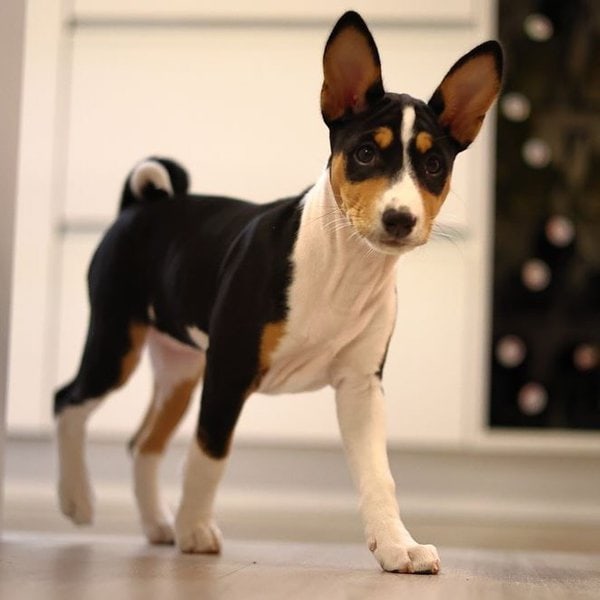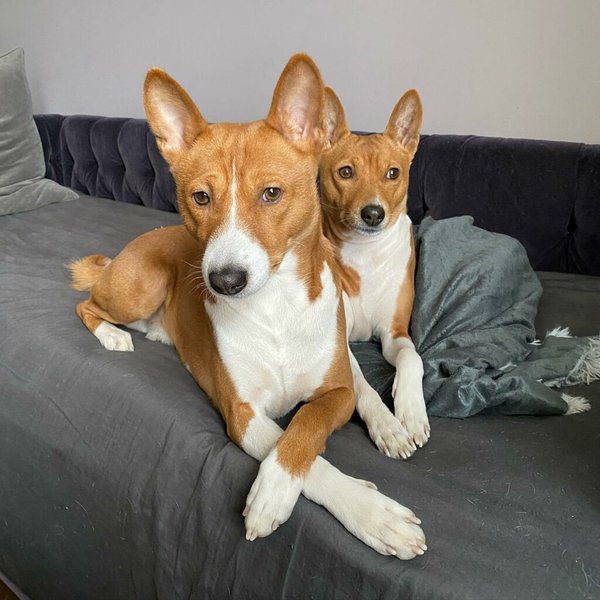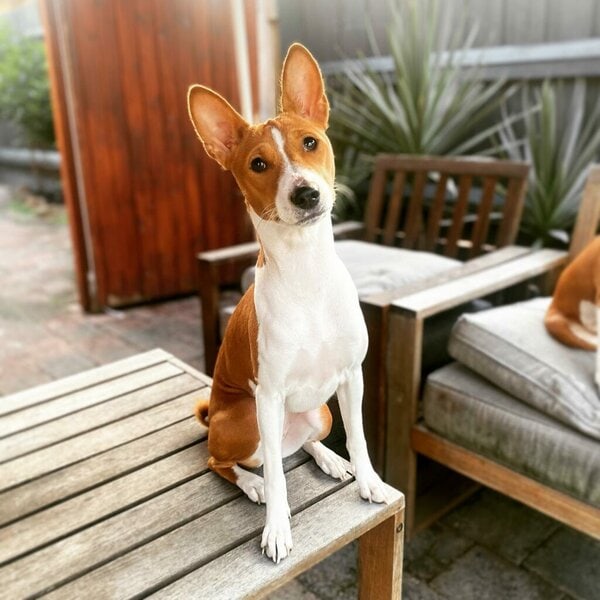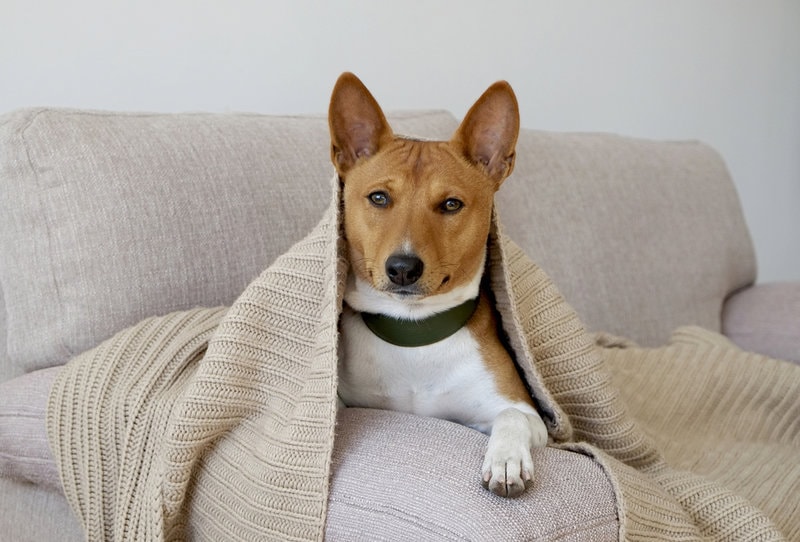You may not have heard of the Basenji since they’re not as common as other popular breeds, such as the Alaskan Klee Klai, Cavapoo, or Pomsky. Basenji dogs originated from countries in Central Africa, like Nigeria and the Congo. Predictably, Basenjis tolerate warm, dry weather well, but they don’t like wet weather or baths.
Basenjis are alert, energetic dogs with strong hunting instincts. This dog breed requires minimal grooming and rarely sheds because of its short-haired coat, making such dogs hypoallergenic. With a tail that curves over its back and perked triangular-shaped ears, the Basenji has a unique appearance. Even more quirky is its oddly-shaped larynx that produces a yodel, earning Basenjis the nickname “the barkless dog.”
Before purchasing this athletic, sleek dog, you should learn the average cost of a Basenji and consider the expenses to make sure you’re knowledgeable and prepared. In this article, I’ll detail everything from their lifespan to temperament to grooming. But first, let’s go over the typical sales price for Basenji puppies.
How Much Does A Purebred Basenji Cost?

When buying from breeders, the average cost of a purebred Basenji puppy is $1,200 to $2,000.
You can find puppies for less occasionally, but reputable breeders charge more for puppies because they’re healthier and better socialized. As a rare purebred dog, the Basenji is more costly from a breeder.
Adoption Costs At Animal Shelters
Adoption fees for Basenjis are usually between $200 and $300. Many dogs in shelters are purebred, but the adoption fee covers spaying or neutering, a microchip for identification, shots, deworming, heart-worm testing and treatment if needed, housebreaking assistance, a collar and leash, and foster-care associated costs.
Shelters will let you adopt a dog without paying an adoption fee if you promise to take care of any medical expenses that you may incur while bringing the dog up to full health.
Costs At A Pet Store
The average price at a pet store is $600 to $700. This includes the costs of spaying and neutering, health testing, and heart-worm treatments. It also includes the cost of veterinary care, which you have to pay upfront when taking your new dog home.
The average amount you’ll spend on food is $50 per month.
Is A Basenji Right For You?
Now that we have laid out the costs of getting a Basenji puppy, you may wonder if this is the right puppy for you.
If your home has small pets like cats or rodents, the Basenji dog is probably not a good fit for you. Because of their strong hunting instincts, they chase down smaller animals. One of the more stubborn dog breeds, the Basenji is notoriously difficult to train. If you’re looking for a quickly compliant dog, keep in mind the Basenji is more likely to try and train you.
Routine Vet Visits
Routine visits are important to make sure that a Basenji is spayed or neutered, receives necessary shots, and continues growing properly. A visit to the vet may cost between $30 and $40 if a dog needs to have an ear infection treated or another minor problem fixed up.
How Many Years Does A Basenji Live?

A healthy Basenji will live for about 12 to 16 years.
You must take proper care of your canine buddy and ensure that they receive the necessary shots every year.
Common Health Issues
Basenjis sometimes develop ear infections, skin problems, and dental issues. They should not be kept in small houses with loud dogs because they become stressed around dogs that bark all day.
Visit the vet regularly. They can help you with any health-related issues your doggie may have. These issues can include but are not limited to Fanconi syndrome, canine hip dysplasia (CHD), corneal dystrophy, patellar luxation, progressive retinal atrophy (PRA), and immunoproliferative enteropathy.
Always keep an eye out for any kind of disease or illness. If you see that your dog is distressed or uncomfortable, do not hesitate to take your dog for treatment.
The Aging Basenji
Basenjis may begin to experience pain due to arthritis once they reach the age of 10 or older. Consider buying a dog cart or simply taking your dog for walks in addition to spending time playing with your furry friend every day.
Some Find Basenjis Difficult
Basenjis can be difficult dogs for some people to own. They do not bark at all, which makes them terrible watchdogs. They are shy towards strangers, which can make them difficult to train. They require a lot of work to socialize, and they can be difficult to housebreak.
The Downside Of A Basenji
Since Basenjis are rare, you may worry about other dog owners judging you if you take your dog to the park. Also, Basenjis can be very hard to train and socialize if you don’t live with another dog since they’re used to being alone. If you don’t have the time and energy required to own a Basenji, it is best not to own one at all.
How To Take Care Of Your Basenji?
Average Cost
The average annual cost of owning a pet Basenji falls between $1,958 and $2,579 per year. This includes the cost of food, dog supplies like toys and treats, medical care, training classes, and miscellaneous costs associated with owning a pet.
High-Quality Diet

The food itself is estimated to cost about $50 every month. This amount is not to be neglected as it is every dog parent’s responsibility to feed their dogs right. With the right food and nutrients, the Basenji can have a fun and healthy life without any health issues troubling itself or you.
You can always set up a consultation with a veterinarian in the city to understand what nutrients are vital for your Basenji. Alternatively, opt for ready-made solutions that include home delivery for convenience. Pet Plate is a prime example and offers a wide range of proteins that will certainly whip up an appetite.
Exercise Routine
While a Basenji bonds strongly with one person and loves to be inside with you, they are high-energy dogs that also love to explore. They need regular exercise to stay happy and healthy. Walk your dogs for at least 30 to 60 minutes per day.
Give your Basenji free time to run around and play, but don’t leave your doggie alone unleashed because they tend to escape. Basenjis are energetic, intelligent, and curious. You must keep them entertained, so they don’t get bored. An ideal activity for your dog is running.
Puppy Toys
Many people may consider a Basenji as a tough dog, but it is still a puppy and it needs toys! You should buy some toys for your puppy if you want to make it happy. Just remember, no small pieces! A good choice is the Nylabone toy which would cost you about $10; it has small parts and won’t come off if your dog chews hard on them.
Are Basenji Good House Dogs? Temperaments Of Basenjis
Basenjis are good house dogs, especially when they are properly trained. They are energetic and bound to bring a lot of joy and laughter with their silly antics. They also get along well with kids. While these furry friends are affectionate with their families, they can be rather wary of strangers.
This highly intelligent breed is also stubborn with a cat-like curiosity. They are difficult to train, so you may want to consider hiring a professional dog trainer.
Professional Trainer
It is estimated that you will pay between $100 and $200 to train your Basenji dog. This may seem like a lot at first, but it is important to remember that you are training your dog for life by getting him professional training each month.
Doggy Daycare

Most boarding house facilities cost an average of $28 per day or $2,560 per year. This is a good option if you have a busy work schedule or are at school all week and can’t keep up with your Basenji’s energy level.
Facts About Basenji
Here are some interesting facts for you to know in further cementing your decision to purchase a Basenji.
- Basenjis are not an aggressive breed, and they have a very mild nature.
- Basenjis are very rare.
- Basenjis are territorial dogs and are not very good with strangers.
- Basenjis don’t bark much, and they can be hard to train.
Do Basenjis Shed? Grooming Tips For Basenjis
Basenjis shed a small amount and are hypoallergenic.
They may cause a mild reaction to those who haven’t been around them before, but then they will slowly adapt. Basenji dogs, like Schnauzers and Poodles, shed dander once a month, which helps to keep allergies to a minimum.
Basenjis shed a little bit of hair but not as much as most other dogs. Because Basenji’s bodies are small to medium, they have less surface area for dander generation. Add in the fact that they naturally produce very little dander, and they’re an excellent alternative for many allergy sufferers throughout the world.
High Maintenance
Basenjis are not high maintenance at all! Humans can be very demanding, and they want things done their own way. If you want a companion who is easy to please, then a Basenji would be that dog for you.
Grooming
Keep your dog clean and dry. Bathing your dog is a must, but don’t forget to dry them quickly since they dislike water.
Give your furry friend a nice bath every four to six months and trim his nails every two weeks. Though this tidy doggie is excellent at self-grooming, brush their hair every two weeks to avoid knots or tangles and keep their coat healthy.
Brushing your canine buddy weekly with the FURminator Undercoat Tool to reach deep beneath your dog’s topcoat to gently remove loose hair. This reduces shedding by up to 90%.
Odor
Like cats, Basenjis groom themselves so they do not have the odor that bigger dogs have. Nevertheless, you must bathe them occasionally. Paws & Pals 6-In-1 Oatmeal Dog Shampoo can be really helpful in this case thanks to its multifunctionality and effectiveness.
Related Questions
Do Basenjis Like Water? Basenjis are not water dogs, so it is best to keep them away from the swimming pool. They are also very playful, and they can easily hurt themselves by jumping from a height of more than three feet. Basenjis feel uneasy in water. One of the primary reasons is that it is a cat-like breed with a phobia of water.
Are Basenjis Low Energy? Basenjis are not a low-energy dog breed, and they are very much the opposite. If you have ever met a Basenji, you would know how much energy they carry around inside of them. They are full of energy, and they need that to spend their time in your house. If it is sealed and confined, then they will just run around and around the house until they get tired.
Are Basenjis Lapdogs? No, Basenjis are not lapdogs at all. Basenjis are highly active and energetic dogs. They will enjoy running around the house and spending some time in the garden with you. This is one of their favorite hobbies, so it is important that you find a way to keep them entertained because they will get bored if you don’t give them enough attention.





